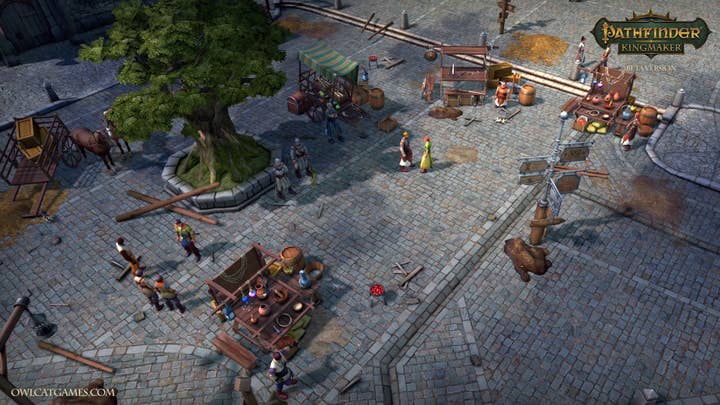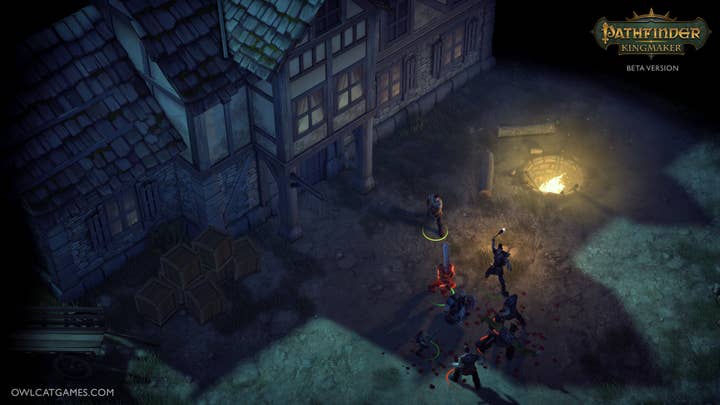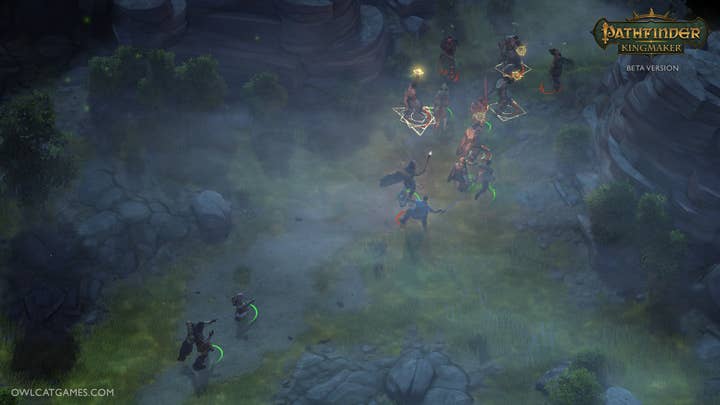How Owlcat Games re-rolled tabletop into a video game
Studio head Oleg Shpilchevsky and narrative designer Chris Avellone discuss the challenges of creating Pathfinder: Kingmaker from the pen-and-paper RPG franchise
Owlcat Games is a newer studio name, but it masks a wealth of experience. Its small but mighty team has worked on a number of games together from Nival Interactive and My.com, ranging all the way back to Rage of Mages in the '90s to Skyforge as recently as 2015.
One thing they all had in common was a desire to try something very, very new.
"To be honest, we were a little bit tired with MMO production after 10 years spent on Allods Online and Skyforge, so we wanted to try something completely opposite from that - a story-driven RPG with multiple choices and meaningful consequences focused on a single-player experience," said Owlcat studio head Oleg Shpilchevsky.
That single-player RPG would be Pathfinder: Kingmaker, set in the universe of Paizo Entertainment's Pathfinder pen-and-paper RPG and inspired by its previously released Kingmaker campaign. With the blessing of Paizo, the team was already hard at work ahead of the game's Kickstarter campaign, but needed the crowdfunding to bolster the project's budget and scope. But even with the well-respected name of Pathfinder, rigorous planning ahead of the campaign, and years of experience in the industry, Shpilchevsky said there were no guarantees going in.
"Kickstarter, or crowdfunding in general, is almost the only way to prove objectively that your idea is worth people's attention"
Oleg Shpilchevsky
"You may hope that your Kickstarter campaign will be successful, but you never can be confident about it," Shpilchevsky said. "That month was probably the most nerve-wracking and stressful period in my whole life. But if the choice had to be made again, we would still run the campaign. Kickstarter, or crowdfunding in general, is almost the only way to prove objectively that your idea is worth people's attention. It's a great way to let your potential core community know about your game, to build the relationship with them and to involve them in game development through playtests, feedback and so on. In addition, crowdfunding allowed us to bring more content into the game including more classes, companions, quests, and especially regarding Kingdom variety."
Shpilchevsky and the others needn't have worried. The Kickstarter was not only successfully funded, but it passed the majority of its stretch goals, bringing in $909,057 compared to its original $500,000 funding goal. The campaign ran in June of last year, with a planned release date set in August 2018 - a fairly quick turnaround compared to other high-profile Kickstarter games. That ambitious launch date was aided by Owlcat's early start ahead of the campaign, and though the game was slightly delayed by a month for polish, it reached release just last week.

Pathfinder: Kingmaker presented a unique challenge for Owlcat. As an existing franchise, there were a number of expectations the studio had to live up to, but few of those expectations came from video games as a medium. The two previous Pathfinder games existed in entirely different genres - MMORPG (Pathfinder Online) and card game (Pathfinder Adventure) - and were completely disconnected from Owlcat's project. In making Kingmaker, the studio was looking not at past attempts to bring Pathfinder to video game form, but to other games with models the team loved alongside the tabletop Kingmaker campaign itself.
"Baldur's Gate was always our beloved reference," said Shpilchevsky. "We strove to recreate the best feelings one may remember from playing this great game. It did not mean our only goal was to make a blunt copy of Baldur's Gate, but let us be honest, the 'Would Baldur's Gate be better with this stuff?' benchmark was applied almost to every new feature or piece of content we were considering."
"The most challenging thing is to recreate the atmosphere of a friendly table playthrough with all the jokes, passionate discussions, curses, etc"
Oleg Shpilchevsky
But to effectively marry the Pathfinder universe to what Owlcat loved about Baldur's Gate, Kingmaker needed something more. Pathfinder fans coming to the game would be looking to recreate at least some of their feelings from their tabletop experiences, something that isn't easily replicated in an entirely single-player campaign.
"From our point of view, the most challenging thing is to recreate the atmosphere of a friendly table playthrough with all the jokes, passionate discussions, curses, etc," said Shpilchevsky. "That's why one of our main focuses was the player's companions - to bring more life to their characters, let them react to your actions according to their personalities, or to support or leave or even betray you depending on player choices."
To that end, Owlcat needed a strong narrative created by experienced narrative designers. And for that the studio turned to veteran scriptwriter and Obsidian Entertainment co-founder Chris Avellone, whose numerous writing credits include Fallout 2, Fallout: New Vegas, Neverwinter Nights 2, Star Wars: Knights of the Old Republic, Divinity: Original Sin II, and Pillars of Eternity.
Those games include a number of common threads, such as complex systems, player choice, and a far-reaching lore - all of which are crucial when facing the challenge of adapting a tabletop game to a video game.

"Pathfinder, like a number of tabletop role-playing games, is a turn-based system, and there are times where adapting turn-based mechanics to real-time mechanics can be a challenge," said Avellone. "It's something designers have wrestled with all the way back to Baldur's Gate 1, in which BioWare had to do a real-time system that simulated the turn-based rules.
"The other challenge is that Pathfinder is a rule-rich system, and there are a lot of classes, spells, and abilities to choose from. We implemented many of them for the game, but we weren't able to include every race, class, and skill - even though I think we did an impressive number, there's simply too many to do them all for this first Pathfinder game anyway. If we do more, we'd be able to expand on the ones we made for this game. It was one of the reasons we had the scaling Kickstarter goals we did - we wanted to make sure we were budgeting realistically for what we could accomplish, and it made the reasons transparent to the backers as well.
"If you can make a player pause at a series of dialogue options or quest solutions and weigh each one for a while, then you've done it right"
Chris Avellone
"Aside from the rulesets, though, one of the key elements of any pen-and-paper campaign is having a good Gamemaster running the adventure, and I think one thing that makes for a good Gamemaster is when they pay attention to your characters, give you an opportunity to shine, and also provide opportunities to see your actions play out in the world in significant ways - basically, they give you the chance to be the hero of your story...even if you're a villain.
Meaningful player choice is something games and studios have flirted and struggled with for years, yet both Shpilchevsky and Avellone cited it as a core component of translating the tabletop experience into video game form. Avellone says it's a challenge he was well-prepared for from his past work on games like Fallout, and it's one he has a clear philosophy for tackling.
"If you can make a player pause at a series of dialogue options or quest solutions and weigh each one for a while, then you've done it right," he said. "Ideally, choices should make you pause and consider carefully what you want to gain, or not lose, with each one. To make choices matter, however, you need to prove early as possible that reactivity in the game exists - and not just that the world is responding to your class, your gender, your alignment, but also the choices you've made, the more specific the better.
"For example, it's one thing for people to label you a goody two-shoes, but it's another thing to be congratulated on, say, upholding the law and enforcing tax collection when the person you're speaking to knows that you've been a friend to merchants in the game and maybe even saved a merchant's life or two. It can't have been easy for you to make the decision to tax those who could been considered your friends, but at the same time, you might get challenged by those same merchants, who might get angry and bluster about why you even bothered to save their lives only to tax them to death. Complications, complications, and more complications - those make for great reactivity, and genuinely make players feel part of the world and invested in it."

Another narrative-related complication that comes with an IP like Pathfinder is its complex lore. In a tabletop adventure, players might have a number of books or online references to delve into whenever they need background, and the longer they play, the more that persistant knowledge benefits their campaign. But Avellone says that cracking open a book when there's a question isn't always the best way to approach a massive video game universe.
"If you've done your job well, within an hour or two, you'll have taught the player a huge amount about the world, and they've had fun doing so"
Chris Avellone
"I find it's best to introduce a world slowly, and for complicated bits of lore, to choose certain personalities or quests in the game that help condense that lore and teach the player through their interactions with it," he said. "I think reading a lore book or getting a character exposition dump of dialogue is a poor way to do this - it's much better if you're ending a bloody feud between two families which requires you to know how the feud started, or solving a quest that requires you study and know a bit about the lineage of the person in the crypt you're plundering to solve a riddle, and so on.
"The important aspect is that at any point in the game, the player has a clear sense of their motivation, their goal, the immediate challenge to that goal from combat, to a locked door, to a stubborn prisoner you need to interrogate, and you can weave the lore around that in small amounts, bit by bit. If you've done your job well, within an hour or two, you'll have taught the player a huge amount about the world, and they've had fun doing so."
Pathfinder: Kingmaker launched last week, and for all the layers of story and gameplay its full release provides, Owlcat isn't done. Shpilchevsky says that the core team has known one another for a long time, many of them meeting through Rage of Mages, Silent Storm, and other older titles. They aren't going their separate ways any time soon, he says, and further expansion of the already-sizable Pathfinder universe (in whatever form that would take) isn't off the table for the future.
"It was Pathfinder which brought the vague dream to make a story-driven game to reality," Shpilchevsky said. "So, despite the fact that there's always more than one interesting opportunity to explore, we would definitely be happy to continue our journey [through the] Pathfinder universe."
